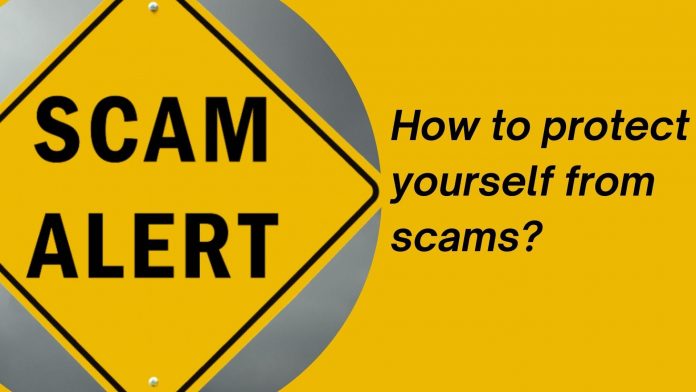The internet has become an integral part of our daily lives. We all spend most of our time online on social media, streaming platforms, gaming, and the list goes on. There are many other things we enjoy online. However, the internet is not all about entertainment. There are many situations when you have to face some problems. Nowadays, different types of scams are being reported daily. That’s the reason you must know about the importance of internet privacy. Hackers and Spiers try their best to take out all your personal information. And if they succeed on their mission, they might use that info to blackmail you. So, you must know how to avoid online scams.
This blog covers a simple but essential topic, “How to protect yourself from scams .”Here, we will discuss different types of scams and also the solutions for those scams. After all, knowing about these scams beforehand will be better than searching for solutions after getting scammed.
List of Scams
The list gets high if we talk about the types of scams online. That’s why here we will discuss some of the most common types of scams:
Phishing
Phishing (pronounced as fishing) is an attack that intends to steal your money or some vital data by getting you to give your personal information (like a credit card, identity card, bank account, etc.) on websites that seem to be authorized.
Scammers create sites that may look legitimate and tempt you to give your personal information. If you fill out forms on such sites, scammers get to know about your accounts and passwords. And then you will become a victim of such fraud. So, you must know how to be safe from phishing sites.
Emergency Scams
Sometimes you may get calls from an imposter claiming to be your friends or relatives, asking for your help and claiming they are in terrible need of it. These types of scams intend to trigger you and get you to pay them emotionally.
Tech Support Scams
Almost all types of scams try to make you feel extreme urgency. Sometimes, you may get pop-up windows opening on your computer claiming that your system is affected by a virus or other malware.
These pop-ups mostly look legitimate and ask people to download an app claiming it will remove the malware from their device. They may look up your device for personal and financial information if you allow them access to your computer.
Bogus Debts
There have been cases where some people become victims of bogus debt collectors. These types of debt collectors claim that you or your family member have not paid their debt, and you should immediately pay it.
While the scams are plenty, there is no need to go through all of them to find ways to stay safe. The basic concept is to not give your data to sites that are not 100% legitimate. And don’t get panic when these types of rascals try to make you feel that sense of urgency. Think calmly and keep yourself cool.
How to protect yourself from scams?
Now having an idea about the types of scams, let’s discuss the tips to avoid them. Some of the major ways to prevent scams are:
Acknowledge the fact that scams exist
Some people neglect that scams can happen to anyone regardless of financial position or other standings. There are many reasons for scams, one of which can be entertainment for the scammer. No matter the reason, your privacy is something that you should value and not neglect. So, taking precautions for such scams is always the best option.
Do not disclose your passwords to others.
You must not share your social media passwords even with your friends or other close ones, as they can get leaked to someone who may have a grudge against you.
Many youngsters tend to share their social media passwords with the person they are in a relationship with. Valuing your privacy is not something you should compromise or be shy about. So, next time anybody asks you your device password or other passwords, don’t be afraid to say just No.
Do not be hasty to click on unknown links.
Some people tend to click on every link they see on social media or open ads that they may find interesting without considering how legitimate the links or ads are. Most of the time, it may not cause any problems. So, they may start thinking nothing will happen to them, even if they open such links.
But people should be aware of it because it is a serious misunderstanding. Some ads or links may not be harmful, but some troublesome scammers are always ready to steal your information. So, you can get scammed by opening such links or pop-up windows.
Monitor your accounts
You should not neglect your social media login activity. You must check if your accounts have been logged in on other unauthorized accounts by someone other than you. While a strong password is a must, you should also consider the possibility of somebody trying to access your accounts.
Check the legitimacy of the sites you visit.
There are a plethora of websites on the internet. While some sites are trusted and not harmful to us, some sites, on the other hand, may hand over our important data to some third-party services. They may even show us nasty ads and redirect us to various phishing sites.
So, first, check the URL or website name at the top. And then, see if you have entered the wrong spelling of the site you want to visit. Suppose you’re sure that you’ve opened the right site and now want to check if the site is legit or not. Then you can just look up the reviews of that site online.
Exercise caution shopping online.
While shopping online, people tend to feel nothing giving their addresses, credit card numbers, and other financial information. At least check if the website you are currently trying to shop from is legit? It will protect you from a potential scam or fraud. Also, pay for them only after getting your service.
What to do if you’ve been scammed online?
Well, some significant ways to protect yourself from such fraudulent activities are mentioned above. However, you can hardly ever be too prudent. So, if your luck did not favor you and you really do become a victim, then you can report such frauds to Federal Trade Commission (FTC).
Also, contact your bank if you think your bank details have been leaked or someone stole your ATM cards. They will do the remaining things for you. Such as freezing your account to restrict others from tempting your account.
How to track down someone who scammed you?
Ways to track scammers differ depending on the type of scam you became a victim of. If you get scammed through phone calls, you can check their phone number and find out who they are. The scammers often call you, claiming they are authorized persons to ask for your details. Without verifying who is on the call, never share details.
You can contact your Mobile Service Provider and report the problem if you suffer from a SIM card swapping scam.
Conclusion
Privacy matters for everyone. If you’re also worried about such scams that may invade your privacy, this blog is just for you. Reading this article enlightens you on the ways to be safe from scams.
Don’t forget that scams are real. And anyone can be a victim of scams and fraud.



















![TamilMV Proxy List Top 30+ [Unblock TamilMV Sites] TamilMV Proxy Unblock](https://technewsgather.com/wp-content/uploads/2023/04/17825836_SL-121019-25870-14-1-100x70.jpg)